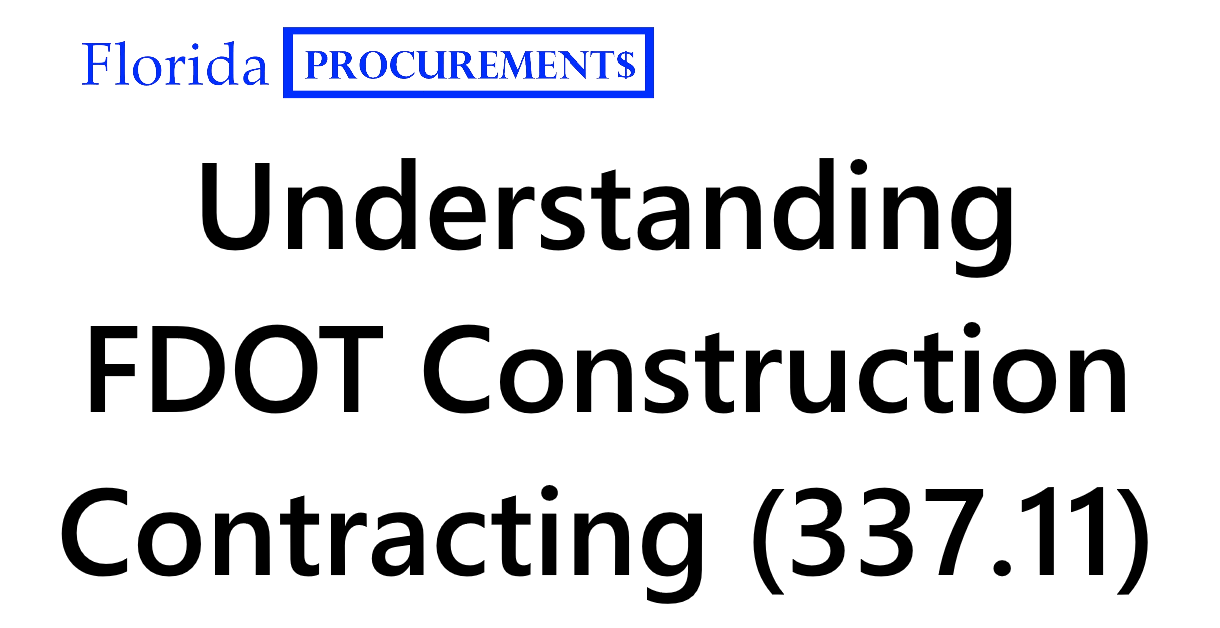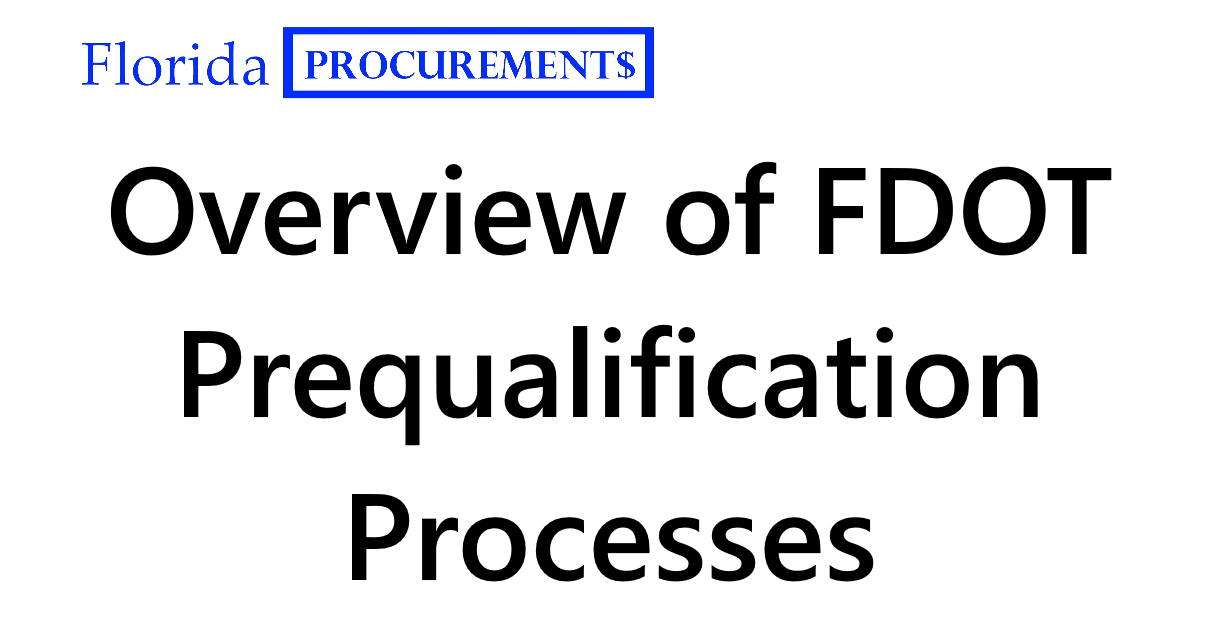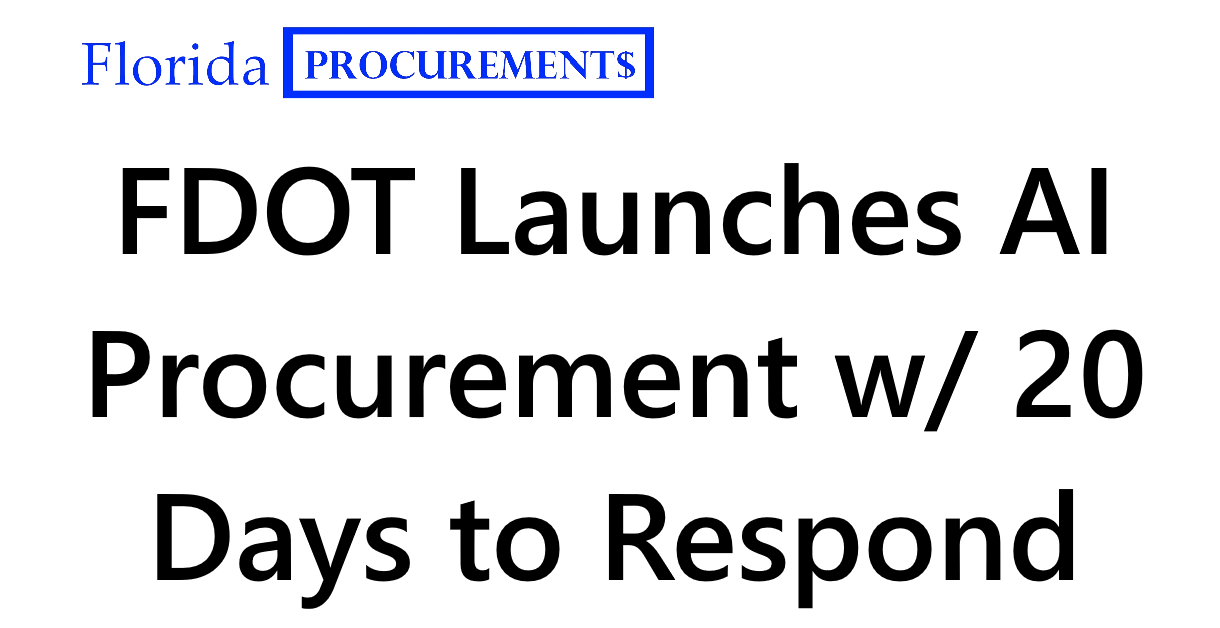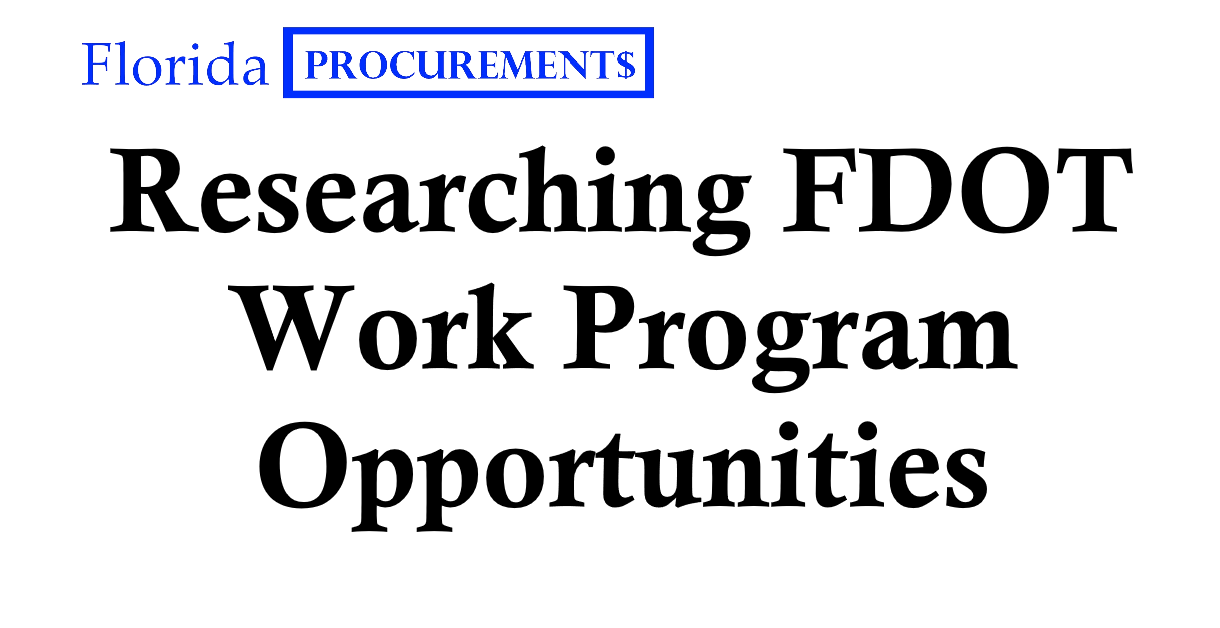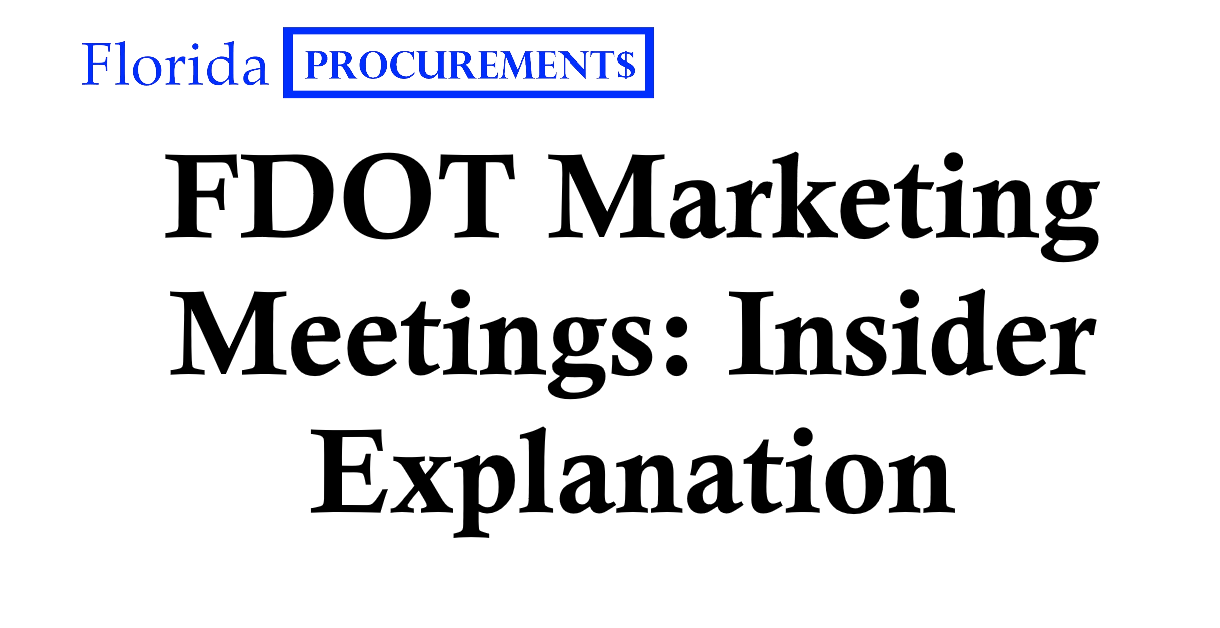
- March 1, 2025
- Sean Gellis
- 0
Welcome to FloridaProcurements.com (FlaProc), your authoritative resource for navigating Florida’s government contracting landscape, with particular focus on transportation and technology opportunities. FlaProc provides free, expert guidance to help companies identify and secure state contracting opportunities throughout Florida.
This resource is maintained by Attorney Sean Gellis of Gellis Law, PLLC, one of less than 75 attorneys Board Certified in State and Federal Government and Administrative Practice by The Florida Bar. Mr. Gellis brings unique insight to government contracting, having served as the Chief of Staff of the Florida Department of Management Services (DMS), General Counsel of the Florida Department of Transportation (FDOT), and Deputy General Counsel of the Florida Office of Insurance Regulation – positions that provided direct oversight of technology initiatives and issues of statewide importance. His record in bid protest litigation reflects the sophisticated advocacy and strategic thinking he brings to government contracting matters, particularly in complex transportation and technology procurements. Sean also leads Procurement Insider, a confidential subscription service that provides technology vendors with strategic intelligence and insider analysis of Florida government opportunities. Learn more about transforming your approach to government contracting at www.gellislaw.com/procurement-insider
Mastering FDOT Marketing Meetings: A Strategic Guide for Transportation Consultants
The Insider’s Perspective
As former General Counsel of the Florida Department of Transportation and Chief of Staff of the Department of Management Services, I’ve participated in many consultant marketing meetings. This unique perspective has shown me precisely what works—and what doesn’t—when firms seek to position themselves for transportation contracts.
Today, I’m sharing an expanded guide to navigating FDOT’s consultant marketing process that goes beyond the procedural requirements to offer strategic insights that can meaningfully impact your success with the Department.
Understanding the Regulatory Framework
FDOT’s marketing meeting process is formally governed by Procedure No. 375-040-010-b, which establishes the guidelines for all consultant interactions with Department staff. This procedure isn’t merely bureaucratic formality—it creates a structured framework that, when properly understood, offers significant strategic advantages for firms seeking transportation work.
The procedure’s purpose is multifaceted:
- For consultants: To showcase capabilities and expertise
- For FDOT: To gather information about available resources and communicate project needs
- For both parties: To ensure fair competition through consistent application of procurement rules
Understanding this dual purpose is your first strategic advantage—what you want from a meeting may be different from what FDOT staff expect to provide.
Types of Marketing Meetings: Strategic Timing Considerations
General Marketing Meetings
The procedure states that general marketing meetings “may be requested by the consultant firm at any time,” which seems straightforward. However, the reality requires more nuance:
- “Any time” doesn’t mean immediate availability—Department staff often have packed schedules
- These meetings are most productive when timed to coincide with the Department’s planning cycles
- The most effective general marketing meetings occur when you have specific capabilities that align with upcoming Department priorities
Strategic Tip: Schedule general marketing meetings quarterly with key FDOT staff to maintain relationships, rather than only reaching out when specific opportunities arise. This consistent presence builds familiarity that can prove valuable when competitive projects are advertised.
Project Specific Meetings
The 30-minute, one-meeting-per-project limit outlined in the procedure presents both constraints and opportunities:
- The two-month window before advertisement is officially designated as the “optimum time frame”
- For complex projects like P3s and design-build-finance initiatives, this extends to 4-6 months
- This timing constraint means you must maximize every minute of your opportunity
Strategic Insight: In my experience overseeing FDOT’s legal department, I found that firms who approached these meetings with well-researched, project-specific questions consistently made stronger impressions than those offering generic capabilities presentations.
Project Informational Sessions
The procedure mentions these sessions, but doesn’t fully capture their strategic value:
- These sessions provide deeper insight into complex projects
- They offer opportunities to gather intelligence in a group setting where competitors are also present
- Districts have discretion on when to hold these sessions
Hidden Opportunity: When attending these sessions, pay close attention to the questions asked by FDOT staff—they often reveal underlying concerns or priorities that won’t appear in the formal solicitation documents.
The Critical Blackout Period: Avoiding Disqualification
One of the most severe procurement mistakes I’ve witnessed occurs when firms violate the strict communication restrictions, known as the “cone of silence,” that begin once a project is officially advertised on the Current Advertisement site.
The procedure establishes that:
- All meetings about a specific project must cease upon official advertisement
- All communications must be directed exclusively to the Procurement Office
- This restriction continues until 72 hours after final selection results are posted
- Violations can result in disqualification
Real-World Consequence: During my tenure at FDOT, I witnessed instances where an otherwise qualified firm was disqualified for violations of this restriction. In one particularly unfortunate case, a firm’s executive reached out to FDOT Secretary to discuss a bidding issue during the blackout period, resulting in their disqualification from a $200+ million contract opportunity.
Strategic Approaches: Beyond the Basics
Having observed marketing meetings from FDOT’s perspective, I’ve identified patterns that separate merely compliant meetings from truly effective ones:
Research-Driven Preparation
The most impressive firms consistently demonstrated thorough preparation:
- They had reviewed all available Consultant Acquisition Plans (CAPs) prior to the meeting
- They understood the specific project challenges, not just the general scope
- They came with thoughtful questions about technical approaches rather than basic inquiries about schedule or budget
Department Insight: Project Managers appreciate consultants who demonstrate understanding of the project’s context within broader Department initiatives. Referencing how your approach aligns with the Florida Transportation Plan or other strategic documents shows a deeper level of engagement.
Relationship Focus vs. Transaction Focus
The procurement process prevents immediate “sales” in these meetings, yet many firms still approach them with a transactional mindset:
- Successful firms focus on demonstrating transportation expertise rather than closing deals
- They ask questions about challenges the Department faces beyond the specific project
- They offer insights that add value to the Department even if they don’t win this particular contract
Strategic Approach: Use the meeting to position your firm as a thought partner rather than just a service provider. Share relevant case studies from similar projects that illustrate lessons learned, even when those projects weren’t your own.
Specificity in Value Proposition
Generic capabilities presentations rarely make a lasting impression:
- The most memorable meetings focus on specific transportation challenges
- They demonstrate how the firm’s approach would address those specific challenges
- They include concrete examples of similar problems solved elsewhere
Differentiation Strategy: Develop 2-3 “signature insights” about the project that demonstrate your firm’s unique understanding or approach. These should be specific enough that they couldn’t be presented by any competitor.
Understanding FDOT’s Decision Process
Many firms misunderstand how FDOT makes consultant selection decisions:
- Technical qualifications are evaluated by selection committees using specific criteria
- The Department can’t simply decide to hire you based on a marketing meeting
- Understanding the evaluation criteria for the anticipated procurement is essential
Inside Perspective: While directly discussing selection criteria during marketing meetings is inappropriate, understanding how FDOT evaluates similar projects can help you highlight the most relevant capabilities during your presentation.
Public Records Awareness
The procedure notes that all documentation shared becomes a public record, but many firms don’t fully consider the implications:
- Competitors can request these materials through public records requests
- Proprietary information should be carefully protected
- Materials should be professional and polished, recognizing they may be more widely viewed
Risk Management Tip: When leaving materials with Department staff, include only information you would be comfortable having shared with competitors. Save detailed methodologies and proprietary approaches for the formal proposal.
Leveraging the Consultant Acquisition Plan (CAP)
The CAP is mentioned in the procedure, but its strategic value isn’t fully articulated:
- CAPs provide a roadmap of upcoming projects
- They identify Project Managers responsible for each project
- They offer insight into timing and anticipated project scope
Strategic Application: Develop a systematic process for reviewing updated CAPs as they’re published. Create a tracking system that aligns your firm’s capabilities with specific upcoming projects, allowing you to target your marketing efforts more precisely.
Post-Selection Debriefings: The Underutilized Opportunity
The procedure mentions post-selection debriefings, but many firms fail to recognize their strategic value:
- These 30-minute sessions provide insight into selection decisions
- They must occur after the 72-hour posting period
- They can be requested for up to two months after final selection
Learning Opportunity: Even when unsuccessful, always request a debriefing. The insights gained about how your proposal was evaluated provide invaluable guidance for future submissions. Come prepared with specific questions about scoring and areas for improvement.
Creating an Integrated FDOT Marketing Strategy
Based on my experience on both sides of the table, the most successful consultant marketing approaches integrate several elements:
- Systematic CAP Review: Establish a regular process for reviewing updated CAPs and identifying target projects
- Relationship Building Calendar: Schedule general marketing meetings with key FDOT staff on a recurring basis
- Project-Specific Research Protocol: Develop a consistent approach for gathering intelligence about specific projects
- Differentiation Planning: For each target project, identify 2-3 unique insights or approaches that set your firm apart
- Blackout Period Protocols: Establish clear internal communication procedures to prevent inadvertent violations
Practical Implementation Steps
If you’re looking to enhance your FDOT marketing effectiveness:
- Review the current CAPs on FDOT’s procurement website to identify upcoming projects aligned with your expertise
- Research the Project Managers for those projects and their backgrounds
- Request appropriately timed meetings within the procedural guidelines
- Prepare project-specific value propositions that demonstrate your understanding of transportation challenges
- Develop follow-up protocols that respect blackout periods while maintaining appropriate relationship continuity
- Track results and refine your approach based on selection outcomes
The Value of Sophisticated Counsel
Navigating FDOT’s procurement process effectively requires more than just following procedures—it demands strategic thinking informed by deep understanding of how the Department actually operates. This is particularly true for complex projects where the stakes are highest.
Having led legal strategy for Florida’s transportation agency and now representing firms seeking transportation work, I’ve seen firsthand how sophisticated counsel can make the difference between winning major contracts and missing valuable opportunities.
Marketing meetings represent your opportunity to demonstrate not just technical capability, but your understanding of transportation challenges and FDOT’s processes. The firms that approach these meetings as relationship-building opportunities focused on solving transportation problems—rather than generic sales pitches—typically find significantly more success in the long run.
Sean Gellis is a Board Certified specialist in State and Federal Government and Administrative Practice and former General Counsel of the Florida Department of Transportation. Through Gellis Law, PLLC, he provides strategic counsel on transportation, technology, and procurement matters, drawing on his unique experience in both agency leadership and private practice. For more insights on Florida government procurement, visit https://www.floridaprocurements.com.


